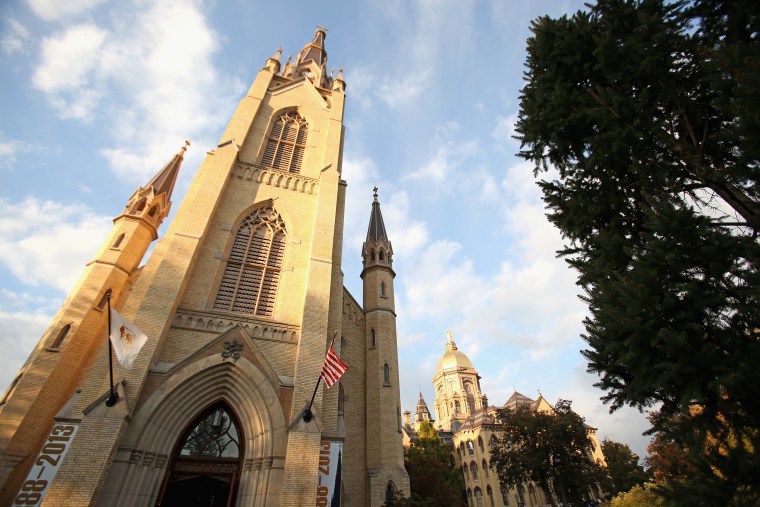Several Catholic universities and nonprofits have gone to court to say that they don't have to fill out a form to opt out of birth control coverage. Not true, said two federal appeals courts within 24 hours of each other.
All insurance plans are required to cover birth control under the Affordable Care Act. Last June, the Supreme Court ruled in Burwell v. Hobby Lobby that for-profit corporations can opt out of birth control coverage if the owners have religious objections. But the Supreme Court didn't specifically weigh in on the Obama administration's workaround for non-profit employers that oppose birth control: Employers can let the insurer know they object by filling out a form, so that the government or the insurer pays for the coverage instead.
Some religiously affiliated nonprofits say that’s not good enough, because they say they’re still being forced to participate in someone getting birth control by filling out the form.
RELATED: Obama administration says birth control must be covered
But in cases involving Catholic universities -- including the University of Notre Dame, and the anti-contraception and anti-abortion group Priests for Life -- a majority of judges said that’s not how the law works. The judges say the form doesn’t “trigger” the coverage, because under law, the default is insurance plans covering birth control; all the form does is remove the employer from the equation. And though some religious and conservative legal groups say that they should have the final word on what is a "substantial burden" on religious freedom, these federal judges beg to differ.
“Although Notre Dame is the final arbiter of its religious beliefs, it is for the courts to determine whether the law actually forces Notre Dame to act in a way that would violate those beliefs,” wrote Judge Richard Posner on Tuesday, on behalf of two our of three judges on the 7th Circuit Court of Appeals.
Notre Dame has already signed the form in question, so its employees are already getting birth control coverage, leading Posner to repeatedly demand what, exactly, the university was asking him to do. At the most recent oral argument in April, an attorney for Notre Dame said they wanted to be treated like churches are – meaning no birth control insurance coverage for anyone.
In his opinion Tuesday, Posner rejected the alternatives that Notre Dame claimed the government could have pursued for women to get contraceptive access. "Does Notre Dame expect the government to establish a federal contraception agency to which Notre Dame women should send the bills for the contraceptives?" Posner asked skeptically.
Less than 24 hours later, the D.C. Circuit Court of Appeals denied Priests for Life and several Catholic educational institutions a rehearing from the full court. The group also wants to avoid filling out the birth control coverage form. The explanation of the court's rejection was written by Judge Cornelia Pillard, who had also written the original November 2014 opinion Priests for Life wanted overturned.
Pillard wrote Wednesday that even though the Supreme Court had ruled for Hobby Lobby, the ruling “does not require us to credit Priests for Life’s legally inaccurate assertions about the operation of the regulation they challenge.”
Until Sen. Harry Reid’s rule change on judicial nominations, conservatives had held up Obama’s nomination of Pillard on the grounds that she is what they termed a radical feminist. The Senate confirmed Pillard in December 2013.
Two D.C. Circuit judges dissented from the refusal to reconsider Priests for Life's case. "What the panel opinion misses is that submitting this form is itself an act that contravenes the organizations’ sincere religious beliefs. It is no different from the recent Holt case, in which the act that contravened the Muslim prisoner’s sincere religious beliefs was shaving his beard. Submitting the form = shaving your beard," Judge Brett Kavanaugh wrote Wednesday.
The Supreme Court has left mixed signals on how it feels about the matter of the form. The majority in Hobby Lobby mentioned it as proof that the government had other ways of getting women contraceptive access, but was cagey about whether the form itself was a burden on religious freedom. Even more confusingly, in July 2014, a few days after the Hobby Lobby decision, at least five members of the court said that another objecting nonprofit institution, Wheaton College, could write a letter instead. A furious dissent written by Justice Sonia Sotomayor and signed by the other two female Supreme Court justices accused the majority of going back on its word.
So far, the objectors to the form have lost in all of their claims, meaning there is no split in the courts and the Supreme Court isn't necessarily compelled to reconsider the birth control access issue. But the plaintiffs can still ask, and the Supreme Court can still decide it needs to clarify whether the impact of Hobby Lobby is as broad as the form-refusers say it is.
